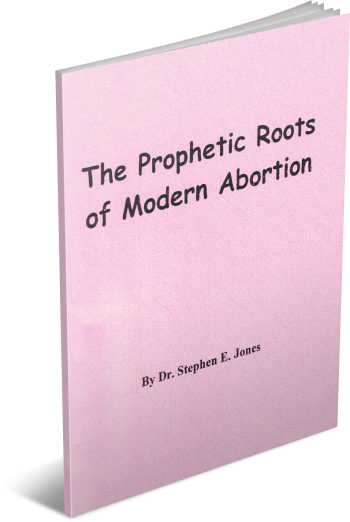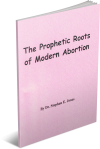Latest Posts
View the latest posts in an easy-to-read list format, with filtering options.

This is a pocket-sized booklet, a 33-page study. It tells the prophetic story of what occurred in 1985 that revealed how the Church under Pentecost aborted and miscarried the Manchild. It also shows how God separated the overcomers from the Church in order that they would not be implicated in this Church decision. God is now working to bring forth the Manchild (“Sons of God”) through the overcomers, in order to prepare for the Tabernacles Age that is to come.
Category - General

Around the time Moses was born, the Egyptian Pharaoh demanded that all the newborn Hebrew male children be killed. Exodus 1:15, 16 says,
15 Then the king of Egypt spoke to the Hebrew midwives, one of whom was named Shiphrah, and the other was named Puah; 16 and he said, “When you are helping to give birth and see them upon the birthstool, if it is a son, then you shall put him to death; but if it is a daughter, then she shall live.
The king’s motive in this was what we call today, “population control.” This comes out in Exodus 1:9,
9 And he said to his people, Behold, the people of the sons of Israel are more and mightier than we.
This is of interest to us, because modern abortion laws are often justified as a method of birth control to reduce the “overpopulation” of the earth.
Because Moses was a type of Christ, we find the same sort of event occurring at the birth of Jesus, when King Herod slaughtered the children of Bethlehem (Matt. 2:16). Matthew then says in the next two verses,
16 Then that which was spoken through Jeremiah the prophet was fulfilled, saying, A voice was heard in Ramah, weeping and great mourning, Rachel weeping for her children; and she refused to be comforted, because they were no more.
This is actually quoted from Jeremiah 31:15. The context is about the return of Joseph, who was lost and presumed dead in the original prophetic story. How his brothers sold him as a slave into Egypt is told in Genesis 37. What is not mentioned, however, is how Rachel could have wept for her children, seeing as how she had died a few years earlier (Gen. 35:19).
The book of Jasher tells us more details. (Jasher is referred to in Joshua 10:13 and again in 2 Sam. 1:18. It was lost for many years, but a very old copy was discovered in the possession of a rabbi and first printed in Venice, Italy in 1613. Most likely, it had been taken by Jews to Spain, along with a huge number of manuscripts saved from the destruction of their country by the Romans. In the 11th century these manuscripts were placed in the college of Cordova, where they remained until after the printing press was developed in 1452. Then they were brought to Venice, Italy. It was translated into English and printed in 1840.)
I have copies available of Jasher for $12.00 (including postage), if any of you want a copy for your library. It should not be viewed as "inspired Scripture," of course, but it is a good history book that supplements the biblical story from Genesis to the death of Joshua.
Anyway, in the 42nd chapter of the book of Jasher, we read the story of Joseph being sold as a slave to Egypt. On the road to Egypt, the caravan passed his mother's grave site. Joseph ran to it and threw himself on the grave, weeping and wailing. Jasher 42:37-40 then tells us,
37 And Joseph heard a voice speaking to him from beneath the ground, which answered him with bitterness of heart, and with a voice of weeping and praying in these words: 38 My son, my son Joseph, I have heard the voice of thy weeping and the voice of thy lamentation; I have seen thy tears; I know thy troubles, my son, and it grieves me for thy sake, and abundant grief is added to my grief. 39 Now therefore my son, Joseph my son, hope to the Lord and wait for him and do not fear, for the Lord is with thee, he will deliver thee from all trouble. 40 Rise my son, go down unto Egypt with thy masters, and do not fear, for the Lord is with thee, my son. And she continued to speak like unto these words unto Joseph, and she was still.
No doubt this is the story that Jeremiah was referencing, "Rachel is weeping for her children." It is a prophecy that the Joseph, the holder of the birthright, and the later chief of the "lost sheep of the house of Israel" would not be lost forever. They would be found in the latter days.
But our current interest in this story is the fact that Matthew links the story to the slaughter of the children in Bethlehem. Because of the impending slaughter, God told Joseph and Mary to take the Christ child to Egypt for His protection (Matt. 2:20). The prophetic parallel between Joseph and Jesus is seen here, as well the connection between Moses and Jesus.
First, in regard to Moses, he was three months old when he was taken into the house of Pharaoh for his protection (Exodus 2:2). So also was Jesus three months old when Joseph and Mary took Him to Egypt for His protection from Herod's rage. I showed in my book, When REALLY Was Jesus Born? that Jesus was born on the feast of Trumpets, Sept. 29, 2 B.C.
Three months later, the Magi came to give Him gifts—no longer in the manger, where the shepherds had found him on the night He was born, but now in the "house" (Matt. 2:11). That night the Magi were warned to return by another way without reporting to Herod, and Joseph was told in a dream to take Jesus and Mary to Egypt.
All of this is interesting, but our current question is this: What does this have to do with Joseph—son of Jacob—going to Egypt? There is the obvious name connection, with two Josephs going to Egypt. But the real prophetic significance of this was not seen until the 20th century.
Most Christians are aware that Christ must come twice. He came the first time of the tribe of Judah. Most, however, are unaware that His second coming is a manifestation of Joseph, rather than of Judah. I covered this in detail in chapters 10 and 11 of my book, The Laws of the Second Coming. It is posted online for you to read, along with all of my books.
The point is this: Since Rachel weeping for her children (Joseph and His children) is prophetically tied to the attempt to kill the Christ child, the story in Matthew 2 is not the final fulfillment of the prophecy. The real fulfillment of the slaughter of the innocents comes in the context of Christ's coming as a manifestation of JOSEPH. This ties it to His second coming.
Thus, we should expect to see a fulfillment of the prophetic type in our day--not merely in His birth in Judah 2,000 years ago.
It should be no surprise, then, that we would see the legalization of "abortion rights" in the past few decades. When viewed in the light of Scripture, we should understand that it is another attempt to kill the Birthright Holder at His birth (or in this case, before He is even born). Not that this would be possible, of course. Jesus Christ is not going to be born as a baby on earth in His second appearance. Nonetheless, it is an attempt to kill THE BODY OF CHRIST, the true Manchild Company through whom Christ is going to manifest as described in 2 Thess. 1:10,
10 when He comes to be glorified IN HIS SAINTS on that day, and to be marveled at among all who have believed . . .
Roe v. Wade legalized abortion in January 1973. This was a major prophetic time marker, because it correlates roughly with Jesus' birth 2000 years ago and precisely with Herod's slaughter of the innocents.
Thirty years later, Jesus began His ministry. Likewise, thirty years after Roe v. Wade, brings us to the year 2003, when President Bush signed into law the ban on partial-birth abortion on Nov. 5, 2003.
Jesus was crucified at the age of 33 and a half. Dating from Roe v. Wade in January 1973, this time period brings us to July 2006. Is it not interesting that South Dakota's new law banning ALL ABORTIONS comes into effect on July 1, 2006?!!
What we are seeing is a pattern for the END of this long warfare--not the beginning of it. The news is good when we look at the long-term prophetic pattern. It is as if we have had to undergo the same type of slaughter of innocents in our day as that which occurred at the birth of Jesus in Judea and at the birth of Moses long ago. But praise God! Those bloody days are coming to an end.
I believe the end is in sight. I will give more evidence of this in Chapter 2.